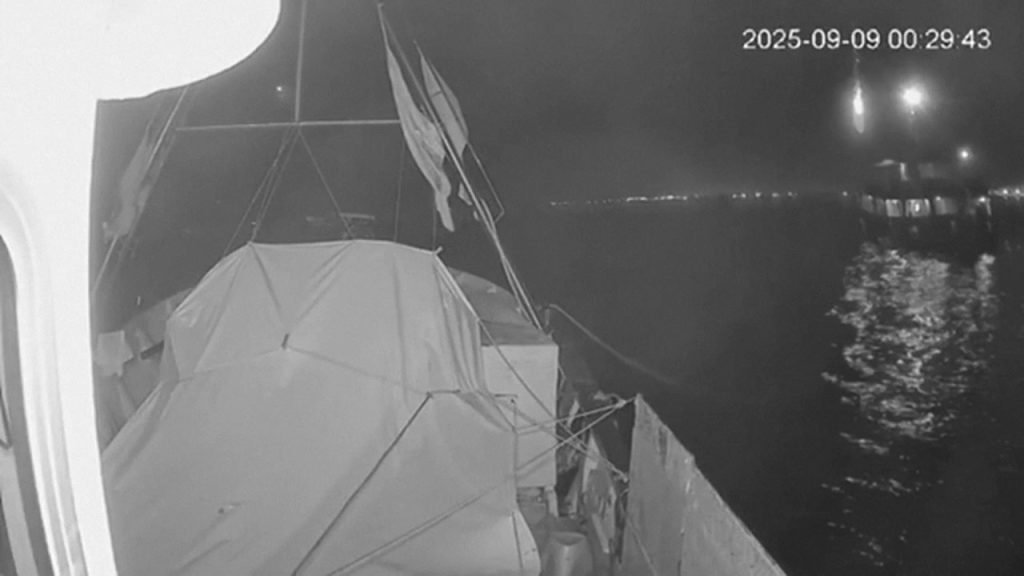Aid Flotilla Incident Sparks Controversy in Tunisia
In a twist of events that has gained international attention, Tunisian officials have firmly denied claims made by an activist group that a drone attacked their humanitarian aid flotilla bound for Gaza. The Global Sumud Flotilla (GSF), a coalition representing 44 countries attempting to deliver essential supplies to Gaza residents, reported that one of their Portuguese-flagged vessels was struck by a drone while docked at Sidi Bou Said port. The incident has highlighted the tensions surrounding aid delivery efforts to Gaza amid the ongoing conflict, while raising questions about what actually occurred on the Tunisian coast.
Tunisia’s Interior Ministry wasted no time dismissing the drone strike allegations as having “no basis in truth.” Instead, officials indicated they were investigating a fire that broke out on the vessel’s deck, suggesting a more mundane explanation for the incident captured in dramatic footage shared on social media. The video, which shows a flash of light followed by flames erupting on one of the boats, has become a focal point in conflicting narratives. Despite the official denial, Portuguese activist Miguel Duarte, who was aboard the vessel at the time, offered a starkly different account during a subsequent press conference in Tunis. He described witnessing a drone hovering “just a few meters” above his head moments before an explosion, claiming it “dropped a bomb” onto life jackets stored on deck, immediately triggering a fire that the crew managed to extinguish without injuries.
The GSF represents a broader international movement aimed at challenging Israel’s naval blockade of Gaza, which has been in place since Hamas took control of the territory in 2007. The flotilla carries humanitarian aid including food, water, and medicine intended for Palestinian civilians caught in the crossfire of the conflict that intensified following Hamas’ October 2023 attack on Israel. High-profile environmental activist Greta Thunberg is among the participants in this coalition, which has framed its mission as a peaceful effort to “break the siege on Gaza.” The group’s determination remains unshaken by the incident, as they stated that “acts of aggression aimed at intimidating and derailing our mission will not deter us” and vowed to continue with “determination and resolve.”
The controversy unfolds against the backdrop of Israel’s continued naval blockade, which Israeli authorities maintain is necessary to prevent weapons smuggling into Gaza. This security measure has significantly restricted maritime access to the coastal enclave, complicating humanitarian aid delivery efforts throughout the current conflict. The GSF’s attempt to deliver aid by sea represents one of several approaches being explored by international organizations and activists to address the humanitarian crisis in Gaza, where civilians face severe shortages of essential supplies. The incident at Sidi Bou Said port has drawn renewed attention to the challenges and risks associated with these aid missions, regardless of whether a drone was actually involved or not.
Following the contested incident, GSF supporters gathered for a press conference in Tunis, waving Palestinian flags and displaying banners in solidarity with Gaza. The visual display of support underscored the emotional and political dimensions of the aid mission, which has garnered sympathy from those concerned about the humanitarian situation in Gaza. Duarte’s testimonial about the alleged drone attack received significant attention during this event, further cementing the division between the official Tunisian government position and the activists’ claims. The discrepancy between these accounts illustrates the challenges of establishing facts in highly charged political contexts, where narratives can quickly become entangled with broader advocacy goals.
As investigations into the fire continue, the incident raises important questions about the security challenges facing humanitarian aid missions in conflict zones and the mechanisms for verifying claims in politically sensitive situations. The conflicting accounts from Tunisian authorities and the GSF activists highlight the complexity of delivering aid to Gaza amid stringent security measures and ongoing hostilities. Whatever the true nature of the incident, it has succeeded in drawing international attention to both the humanitarian crisis in Gaza and the difficulties faced by those attempting to provide relief. As the GSF pledges to continue its mission despite the setback, the incident serves as a reminder of the significant obstacles that remain in addressing the humanitarian needs of civilians caught in protracted conflicts, where even efforts to deliver essential supplies can become entangled in controversy and competing narratives.















